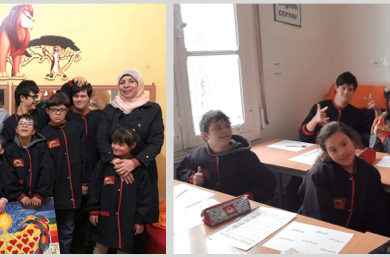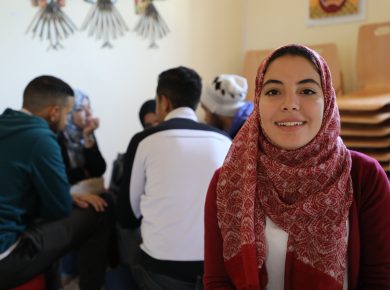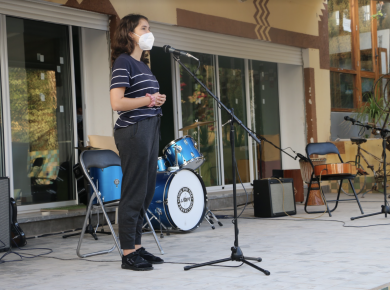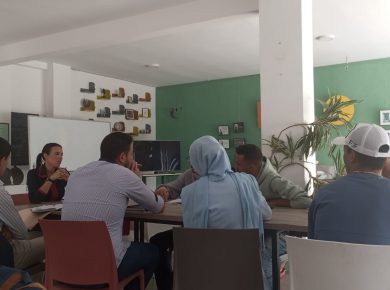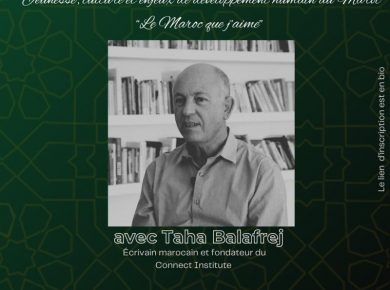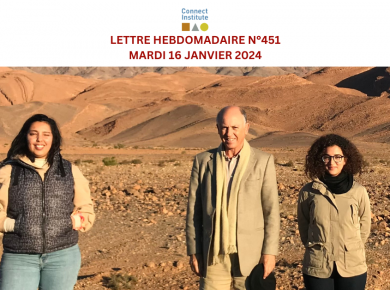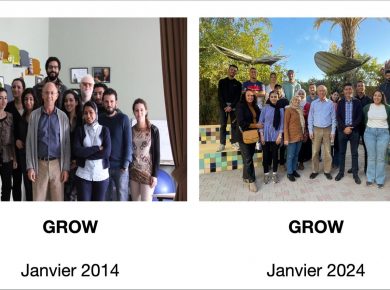Cette semaine, quatre de nos jeunes du programme MOMKIN ont eu l’occasion de voyager à Ben Guérir pour visiter MAHIR Center et assister à une rencontre avec Fouad Laroui et Ahmed Abbadi.
Voici ce qu’en a pensé Hajar :
The session started at 9:30 A.M. Abbadi initiated the talk by expressing his sincere gratitude and happiness to be among a community of youth in MAHIR. He said: “This is an out of bulk program”. He then started his intervention on how to deal with religion in our everyday life and what should be corrected. He stressed on the importance of reading and analyzing when it comes to religion. Since there are 15 great books, 18 sciences among Islam and 80 000 texts, there is a necessity to use an algorithm that would ease the process of checking and allow us to understand the history of Islam.
Why do we stick to the 4% of binary oppositions in Quran while denying the rest ? This was one of the questions that were raised during the discussion; Abbadi defended the idea that there is a whole propaganda disseminating ideas against Islam in order to keep people scared and subalternated.
He raised important aspects that turn around religion including its functionality, memory recovering, identity substitutes, religious binary oppositions, religious research findings and the symbolism of the verse. He adds that the ultimate goal of religion that is not only to achieve happiness but also monotheism (التوحيد) and connectedness (الاتصال)
Abbadi seized the opportunity to speak about perseverance and organization that helped Chinese people to achieve their goal of reading Harry Potter in Mandarin. They split the tasks and translated it overnight. Finally, Chinese children could read Harry potter in their own language, the reason why Chinese people are an example to follow.
He claims that we need to use certain filters to deal with falsified texts including authenticity, engineering and contextualization. To fight terrorism, prevention is not enough to remain safe, we need immunity. They know what people need and want so they directly target that. There are 5 aspects:
- The unification dream: terrorists use the excuse that they are doing that to unite Muslims
- Dignity dream: we are going to teach your children Quran, provide you a job, a wife, virgins and the money of God.
- Purity dream: we are going to teach the real Islam of God.
- Apocalypse: one should book their room in the end of the world.
- Mastering what surrounds them: good / bad, believers/ non-believers, us/ them, apostasy
Some of the arguments that terrorists use to back up their speeches is Israel, colonization, humiliation, falsification of history, resource drainage, burning of Quran and insulting the prophet. Indeed, they also say that they are doing that to liberate people from all the enslavement they are suffering from every day.
If we need to convince people of the importance of religion in life; we should use different methods to different social segments and classes, for example, we should have game specialists working specifically to design games to play with children in a way that would explain to them Islam and its sayings.
I concluded with the question to what extent does religion kill culture? Abbadi answered my question wittily saying that religion and culture are interrelated entities that cannot be split; one affects the other. If one feels that culture is dying, it is not specifically because of religion but maybe coming from other aspects that might be the audiovisual media.
Around 2:54 P.M. Fouad Laroui joined us.
He is a novelist, engineer, economist and a member of the Commission for the New Development Model.
Laroui started talking about the commission he is part of and said “Concerning the commission, I think we are not really coming up with a new model, we are going to change, refine and adapt the already existing model to the needs of the society, and believe me! Education is one of the words that are used repeatedly during our conversations” but of course other domains are taken into consideration. We should know that Sweden has become a cashless society in order to fight corruption and this is an example among many that we should follow to cut out the problem from its roots.
Laroui stressed on the significance of having general knowledge, critical thinking and a certain technicality in order to maximize your chances of getting a job or opportunities that you want. And since one of the Mahiros is reading Dieu, les maths, la folie, she wanted to know the difference between the writer and the Mathematician; Laroui explained:
- The mathematician: tends to use proofs (البرهان) to back up their statement.
- The writer: uses mostly rhetoric (البلاغة) during the process of writing.
Laroui adds” I write based on some anecdotes; anything that I see or hear in my daily life. It is funny that my friends say: you should not tell Fouad about anything otherwise he is going to turn it into a book”. Les tribulations du dernier Sijilmassi was written based on a schema that I drew on the wall of my house. I drew a timeline that depicts the chronology of events in the novel in order to follow and respect all the details. It is not an easy read but I am happy you did an effort to read it and discuss it.
In fact, I had a Writer’s block once in my life and I remember it like it was yesterday. 15 years ago; I was in the south of France with a friend who is a writer as well. In a beautiful day in the countryside with the sound of birds chirping, we decided to go on a tour in the car around that neighborhood. As we drive, two men, with their motorcycles, overtook us. A minute later, we found them dead on the ground. From that moment on I failed to express that feeling of precariousness in life. Laroui’s passage ended with a brief description of the various ecosystem groups that are in MAHIR, a small presentation of their realizations and what they are working on for the upcoming seminar on May 2020.
The two personalities were interesting to hear and discuss with, but I felt that in the morning the majority of us interacted with Abbadi, raised questions and commented while in the afternoon, few of us interfered to ask, add or comment during the session. I don’t know if it is due to the language used or we just shy away, Laroui used mainly French and some participants, I think, were a bit intimidated by their level in French so they kept silent. Abbadi spoke an amalgamation of English, French but mainly Arabic which made the messages easy to grasp by everyone, and made everybody feel at ease to speak up.

